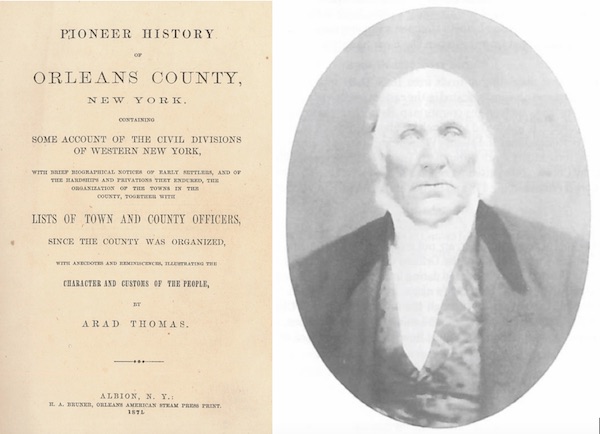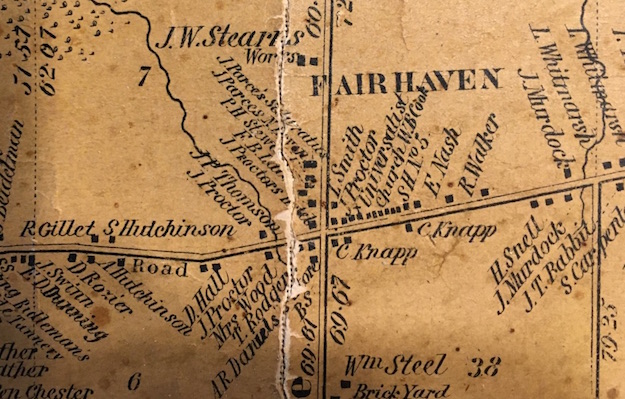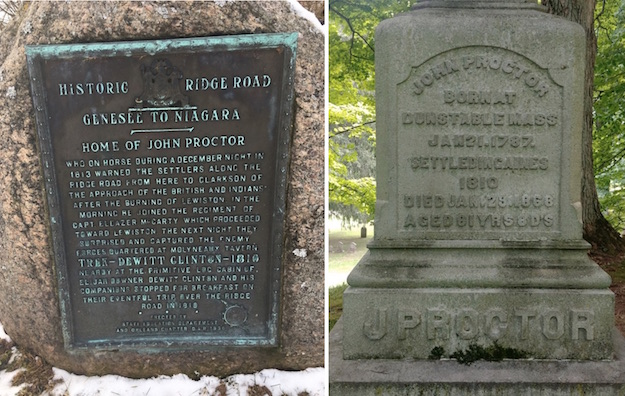Historic Childs: John Proctor’s autobiography details life of prominent local pioneer

The cover at left is for the book, Pioneer History of Orleans County. The image at right is the only known photograph of John Proctor.
By Doug Farley, Cobblestone Museum Director – Vol. 2 No. 44
GAINES – One of the most widely read written histories of Orleans County is entitled, “Pioneer History of Orleans County, NY,” by Arad Thomas, written in 1871 and published in Albion. In this 463-page compendium we are fortunate to find an autobiographical sketch of John Proctor, the patriarch of what many called Proctor’s Corners.
Proctor has been the subject of a few recent articles written for the “Historic Childs” series, but the addition of an article detailing the earliest days of Fair Haven (known as Childs today) written by John Proctor himself, is a valuable addition to this information. Proctor wrote the following narrative in June 1863, a little short of five years before his death in January 1868.
I was born in the town of Dunstable, Middlesex County, Massachusetts, January 22, 1787. In March, 1810, I arrived in Batavia, since changed to Gaines, on the Holland Purchase, and purchased a lot of land near the Transit Line. I chopped over five acres of land and built a log cabin in what was then called the ‘Nine Mile Woods.’ My cabin was situated seven miles from any cabin going east, and two miles west. There were no inhabitants going south nearer than Batavia village. Here I kept bachelor’s hall, sleeping in the open air on hemlock boughs until I had completed the roof of my cabin, which I covered with bark. I had to travel seven miles to get bread baked.
I went to Massachusetts in the summer and returned to my cabin in January. In the spring of 1811, I cleared off and planted three acres to corn, and in the fall sowed five acres to wheat. In December I went back to Massachusetts on foot. February 11th, 1812, I was married to Miss Polly Cummings, of Dunstable, and started on the 12th with my wife for my home in the woods, in a sleigh drawn by two horses.

Fair Haven, 1852 map
When we arrived at our new home, at what has since been called Fair Haven, in the town of Gaines, there were but three families in Gaines, viz.: Elijah Downer, Amy Gilbert, and —Elliott. The nearest grist mill was at Black Creek, twenty miles distant, and on account of bad roads it was as easy for us to go to Rochester to mill, a distance of thirty miles. Indians came over from Canada and massacred several of the inhabitants on the frontier, and many of the settlers fled out of the country for safety. The people throughout this region were in great consternation.
The news of the approach of the savages spread rapidly. William Burlingame, who resided about four miles west of my place on the Ridge, called me out of bed and requested me to go immediately and arouse the people east. I immediately mounted my horse, the only horse then owned in the vicinity, and before next daylight visited all the inhabitants as far east as Clarkson.
The effect of the notice was almost electric, for quite a regiment of men in number were on the move early the next morning, to check the advance of the enemy. We marched west to a place called Hardscrabble, near Lewiston, and there performed a sort of garrison duty for two weeks, when I with some others returned, for, having been elected collector of taxes, it became necessary for me to attend to the duties of my office.
Again in September, while the war was in progress at and near Fort Erie, in Canada, news came to us that the British were about to attack the Fort and our troops there must be reinforced. In company with several others I volunteered to go to their relief. On arriving at the Fort, via Buffalo, we made several attacks on the enemy near the Fort, and in the woods opposite Black Rock.
A sortie was made from the Fort September 17th, in which we routed the enemy. In these actions several bullets passed through my clothes, and one grazed my finger. A man of our company named Howard was killed, another named Sheldon was wounded in the shoulder, and Moses Bacon was taken prisoner and carried to Halifax.
In that sortie General Davis, of Le Roy, was killed, and Gen. Peter B. Porter was taken prisoner, and rescued again the same day. We came home after an absence of twenty-four days.

The Proctor monument (left) is located on Route 104 in Gaines. The Proctor family obelisk is located at Mount Albion Cemetery. The other sides of the monument memorialize Proctor’s wives and children, several of whom died in a typhoid breakout in 1828.
About February 1st, 1815, I was notified to attend the sitting of the court in Batavia as constable. Owing to the situation of my family I could not be long absent from home; and in order to get released from court, it was necessary for me to appear before the judge; so taking a rather early start I reached Batavia before the court had opened in the morning. After the court had organized for business I presented my excuse and was discharged.
After that I collected over one hundred dollars taxes, made my returns as town collector, on half a sheet of paper, took a deed of one hundred acres of land of the Holland Company, and an article for another hundred acres and started for home, where I arrived in the evening of the same day, having traveled a distance of not less than forty-four miles.
In December, 1818, I made arrangements to visit my friends in Massachusetts, on horseback. Several of my neighbors were in to see me off. As I was about to mount my horse a deer came down the creek from the south. I ran into the house and got my gun and some cartridges I brought from the war, loaded my gun as I ran out, and as the deer was passing leveled my gun and snapped it, but it missed fire. I took up a stone and struck the flint, and snapped the gun again before the deer got out of range. This time it discharged killing the deer instantly. I remained now and helped dress the deer and divided it with our neighbors, and then went on my journey.
I rode to Vermont, there exchanged my horse and saddle for a cutter and another horse, and drove to my destination, near Boston. After an absence of about sixty days I returned home in time to dine off a piece of the venison I killed just before starting, which had been kept by my wife.
Our associations in our wilderness home undergoing fatigue and hardships together, sharing alike in gratitude for every success, and in sympathy for every adversity, bound the early settlers together as a band of brothers.
For many years our religious worship was held in common together, with no denominational distinctions.
JOHN PROCTOR.
Gaines, June 1863.





































































